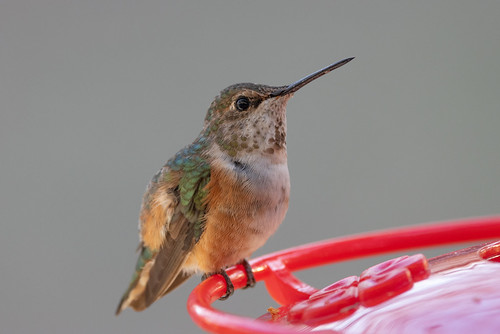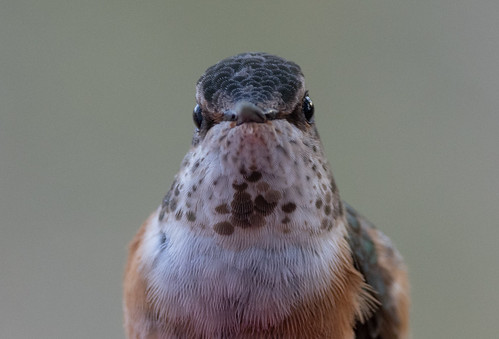(The photos on this blog post are all from December 4, 2021.)
Saturday, December 4, 2021, was pleasant for this time of year, with clear skies, fairly strong southwest winds, and temperatures reaching 41º F in my yard. The Rufous Hummingbird looked very healthy, and I saw her many times throughout the day, feeding as usual at my feeders, occasionally resting as usual in my spruce tree, and often flying toward the back of my yard where there are plenty of insect-supporting plants.
In mid-afternoon, the winds started decreasing and shifting a bit to the northwest while the skies stayed clear. The last time I saw the hummingbird was at 3:48 pm, when the temperature in my yard was about 32º. At that point, she'd have had gentle tailwinds if she started moving on.
Clouds didn’t start blowing in until 6 or 7 pm, and a few hours later the winds picked up from the east. By 7 am Sunday, December 5, a half hour before sunrise, the temperature at my place was 24º, still fairly mild compared to many nights in November, but snow was falling almost horizontally, and the southeast wind was blowing at 15 mph and increasing through the morning. We'd had much colder temperatures, even stronger east winds, and blowing snow before during her stay here through November.
I set out my hummingbird feeders as usual at 6:45 and sat at the window watching without taking a break until 9 am, but she didn’t show up. I kept vigil all day but I never saw her, nor did Jeanne or Jennifer at their feeders. This was the first day since she appeared before Halloween that none of us saw her. Sunday would have been a horrible day to migrate against those awful easterly winds, to say nothing of the blowing snow, and the temperatures are predicted to get very low in the next couple of days.
If she roosted here Saturday night, it’s hard to believe she couldn’t have made it through the night—she’d had excellent conditions all day for stoking up on natural food as well as sugar water. The high was 41º and it didn’t get below freezing all day, so finding insects would have been easy. The storm started early Sunday morning, but the overnight low of 24º at my house was much higher than what the hummingbird has already easily survived.
I don’t know how to weigh probabilities, but any of these might have happened:
1) She got killed by a predator or in an accident. That isn't likely, but it's a possibility with any bird.
2) She died of hypothermia in her sleep Saturday night or upon waking up Sunday morning. That is very unlikely with nighttime temps in the mid-20s after a day when she ate well. If she didn’t show up one morning after the temperature had been in single digits or worse, I’d be resigned to her having died overnight, but Saturday night was easily survivable.
3) She sensed the approaching storm, spent the whole day Saturday, while winds were unfavorable, stoking up for a journey, and headed out after her last feed right as winds were becoming favorable. The sky was still clear and sunset was at 4:20, so she still had a good half hour of light at that point. It’s quite possible she kept going all night, as Ruby-throated Hummingbirds flying over the Gulf of Mexico must do.
The third possibility is obviously what I hope happened, but it's also what I believe really did happen. She won't call or even text, and no hummingbird banders were able to come here to band her, so there is no way we can ever know for sure, but birds are known to recognize signs of oncoming bad weather, and there was a window of time when conditions were very favorable for her to safely move on with a lot of fuel from the mild day's foraging. I’ll keep my feeders out for the next three days and keep monitoring them, in case she does return, but I’m pretty certain she’s moved on from Peabody Street for the duration.
I'm relieved that she's gone, both because winter really is setting in now, but also because I've been chided and even scolded by so many uninformed people saying she needed to be "rescued." Even some ostensibly knowledgeable people criticized me, sometimes publicly, for keeping out my feeders and/or for allowing birders to come see her, "stressing her out." She had two other yards with feeders to visit if she didn't want to be near birders, and it's not like I didn't already have experience with another November-December hummingbird—another real-life case with a good outcome. Dealing with so much comment and criticism was stressful and exhausting for me.
But I feel pure, unadulterated gratitude that this hummingbird visited my neighborhood; deep satisfaction knowing that Jeanne, Jennifer, and I did everything we could to make her stay a safe one; pride in the birding community that enjoyed her while not at all stressing out the bird, my family, or my neighbors; pleasure that I could share her story with so many people who cheered her on; and hope that she's found a new neighborhood well to the south of here that is just as welcoming but a little less frigid. Thank you, little bird, from the bottom of my heart.


